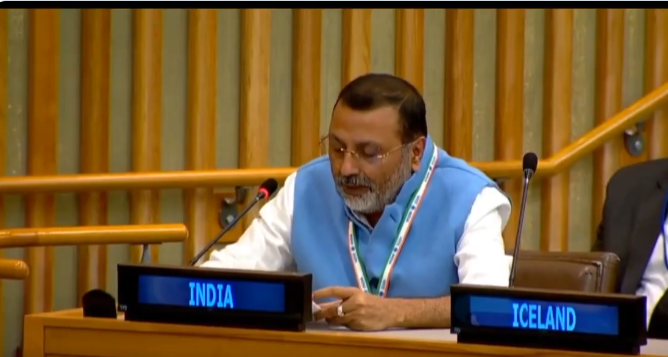India Slams Pakistan at UNGA Over Child Rights Abuses and Cross-Border Terrorism

India’s Response to Pakistan at the 80th UNGA: A Firm Stand on Child Rights Abuses and Cross-Border Terrorism – Expert UPSC Analysis
Introduction
At the 80th Session of the United Nations General Assembly (UNGA) in New York, India delivered a strong rebuttal to Pakistan’s attempts to politicize the global platform by diverting attention from its own human rights violations and record of terrorism. Nishikant Dubey, representing India’s Parliamentary Delegation, sharply criticised Pakistan’s systemic child rights abuses and state-sponsored cross-border terrorism, reaffirming India’s consistent stance on global peace and accountability.
I. India’s Core Message at UNGA
In his address, Mr. Dubey condemned Pakistan for:
- Gross violations of child rights within its borders, especially in conflict-affected areas.
- Failure to implement the UN’s Children and Armed Conflict (CAAC) agenda, despite being repeatedly cited in UN reports.
- Use of terrorism as an instrument of state policy, targeting civilians, including women and children, in Jammu and Kashmir.
He referred to the 2025 UN Secretary-General’s report, which documented grave abuses such as:
- Recruitment and use of children by armed groups.
- Destruction of educational institutions, particularly girls’ schools.
- Cross-border shelling and violence along the Afghanistan–Pakistan frontier, leaving children dead or disabled.
II. India’s Counter-Narrative on Pakistan’s Role in Terrorism
Mr. Dubey cited the Pahalgam terror attack (April 22, 2025)—in which several civilians, including women and children, lost their lives—as direct evidence of Pakistan’s sustained sponsorship of terrorism.He defended Operation Sindoor, launched by India as a legitimate, proportionate, and sovereign response to safeguard its citizens and uphold justice. India reiterated that its counter-terrorism measures are fully compliant with international law and the UN Charter’s right to self-defence.By invoking specific incidents and data, India sought to highlight Pakistan’s double standards—claiming to champion human rights globally while systematically violating them domestically and across borders.
III. Broader Diplomatic Context
India’s statement comes amid Pakistan’s renewed attempts to internationalize the Kashmir issue and deflect scrutiny from its deteriorating internal security and governance failures.India’s response at UNGA reflects three core diplomatic principles:
- Zero Tolerance for Terrorism: Reiterating that terrorism, in any form or justification, is unacceptable.
- Domestic Accountability: Urging Pakistan to introspect on its internal crises, including child exploitation and religious radicalization.
- Global Responsibility: Calling on the international community to hold state sponsors of terrorism accountable, especially those violating international humanitarian law.
IV. Reference to the UN’s “Children and Armed Conflict” (CAAC) Agenda
The UN’s CAAC framework identifies six grave violations against children in conflict zones:
- Killing or maiming of children
- Recruitment or use of child soldiers
- Sexual violence against children
- Attacks on schools or hospitals
- Abduction of children
- Denial of humanitarian access
Pakistan has consistently appeared in UN reports for its failure to prevent such violations, particularly in the Federally Administered Tribal Areas (FATA), Balochistan, and Khyber Pakhtunkhwa. Armed groups operating from its territory have engaged in the targeted destruction of schools, recruitment of minors, and cross-border militant activities that harm children on both sides of the border.
V. India’s Broader Foreign Policy Position
India’s strong statement at UNGA aligns with its broader diplomatic strategy:
- Global Counterterrorism Advocacy: India continues to push for a Comprehensive Convention on International Terrorism (CCIT) at the UN, seeking a unified definition and accountability for terrorism.
- Human Rights Diplomacy: By highlighting Pakistan’s human rights record, India reinforces its image as a responsible democracy committed to global norms.
- Regional Security Leadership: The address signals India’s readiness to lead regional counterterrorism cooperation while maintaining moral authority on human rights.
VI. Implications for Bilateral and Multilateral Relations
- Bilateral Relations: The exchange reinforces the frozen diplomatic state between India and Pakistan since the abrogation of Article 370 in 2019 and the Pulwama-Balakot incident.
- Multilateral Forums: India’s remarks will strengthen its moral and diplomatic position at the UN Human Rights Council, UNSC, and other global platforms.
- Global Image: By focusing on children’s rights and terrorism simultaneously, India positions itself as a proponent of humanitarian security, integrating moral and strategic dimensions of diplomacy.
VIII. Analytical Perspective
India’s intervention at UNGA reflects a dual diplomatic strategy—moral assertion combined with strategic realism. By linking child rights abuses with state-sponsored terrorism, India has broadened the narrative from a bilateral dispute to a global humanitarian concern.This approach not only isolates Pakistan internationally but also reinforces India’s standing as a nation advocating justice, accountability, and rule of law. The articulation by a parliamentary representative, rather than a diplomat, further underlines India’s domestic consensus and political unity on issues of national security and global responsibility.
IX. Conclusion
India’s statement at the UNGA represents a firm, fact-based, and ethically grounded diplomatic response to Pakistan’s habitual deflection and denial. By exposing Pakistan’s violations against children and its continued use of terrorism as state policy, India has reaffirmed its commitment to human rights, peace, and security.The episode reiterates India’s larger foreign policy vision — that true international credibility arises not from rhetoric, but from responsible conduct at home and abroad.
Updated - October 14, 2025 7:36 AM | News On Air